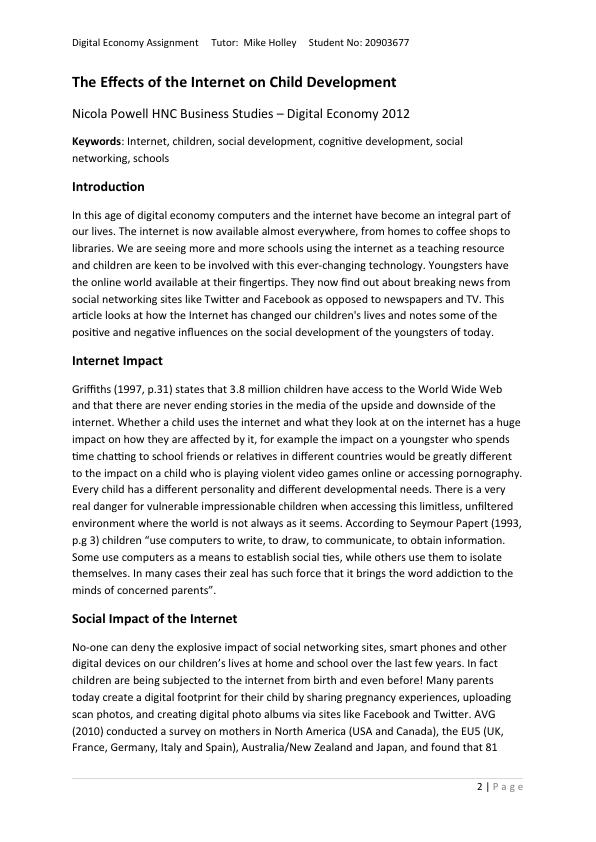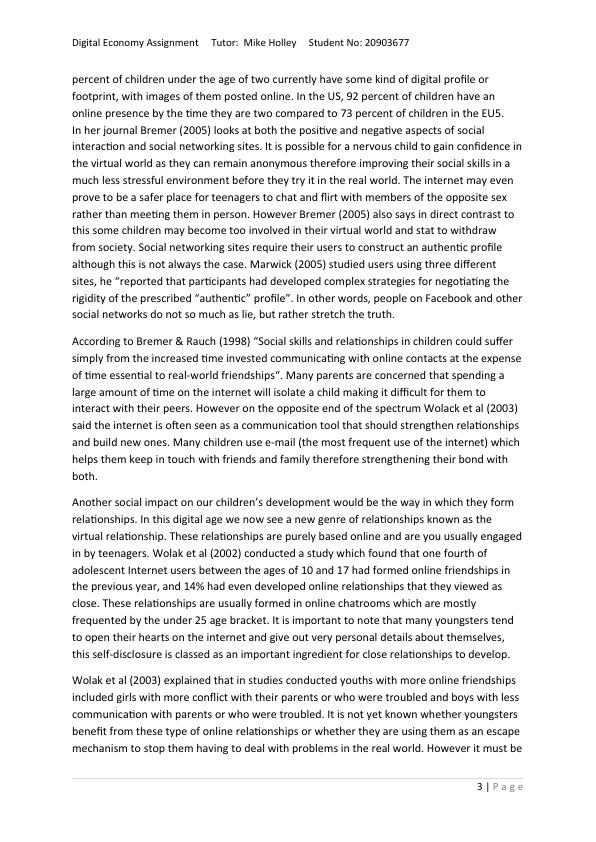Effects of the Internet on Child Development
9 Pages3278 Words37 Views
Added on 2023-01-20
About This Document
This article explores the positive and negative influences of the internet on the social development of children. It also discusses the impact on cognitive development and academic achievement.
Effects of the Internet on Child Development
Added on 2023-01-20
ShareRelated Documents
Digital Economy Assignment Tutor: Mike Holley Student No: 20903677
Course Title: HNC Business Studies (Yr 2) Level 5
Module Title: Digital Economy
Module No: G106432
Module Tutor: Mike Holley
Student Number: 20903677
1 | P a g e
Course Title: HNC Business Studies (Yr 2) Level 5
Module Title: Digital Economy
Module No: G106432
Module Tutor: Mike Holley
Student Number: 20903677
1 | P a g e

Digital Economy Assignment Tutor: Mike Holley Student No: 20903677
The Effects of the Internet on Child Development
Nicola Powell HNC Business Studies – Digital Economy 2012
Keywords: Internet, children, social development, cognitive development, social
networking, schools
Introduction
In this age of digital economy computers and the internet have become an integral part of
our lives. The internet is now available almost everywhere, from homes to coffee shops to
libraries. We are seeing more and more schools using the internet as a teaching resource
and children are keen to be involved with this ever-changing technology. Youngsters have
the online world available at their fingertips. They now find out about breaking news from
social networking sites like Twitter and Facebook as opposed to newspapers and TV. This
article looks at how the Internet has changed our children's lives and notes some of the
positive and negative influences on the social development of the youngsters of today.
Internet Impact
Griffiths (1997, p.31) states that 3.8 million children have access to the World Wide Web
and that there are never ending stories in the media of the upside and downside of the
internet. Whether a child uses the internet and what they look at on the internet has a huge
impact on how they are affected by it, for example the impact on a youngster who spends
time chatting to school friends or relatives in different countries would be greatly different
to the impact on a child who is playing violent video games online or accessing pornography.
Every child has a different personality and different developmental needs. There is a very
real danger for vulnerable impressionable children when accessing this limitless, unfiltered
environment where the world is not always as it seems. According to Seymour Papert (1993,
p.g 3) children “use computers to write, to draw, to communicate, to obtain information.
Some use computers as a means to establish social ties, while others use them to isolate
themselves. In many cases their zeal has such force that it brings the word addiction to the
minds of concerned parents”.
Social Impact of the Internet
No-one can deny the explosive impact of social networking sites, smart phones and other
digital devices on our children’s lives at home and school over the last few years. In fact
children are being subjected to the internet from birth and even before! Many parents
today create a digital footprint for their child by sharing pregnancy experiences, uploading
scan photos, and creating digital photo albums via sites like Facebook and Twitter. AVG
(2010) conducted a survey on mothers in North America (USA and Canada), the EU5 (UK,
France, Germany, Italy and Spain), Australia/New Zealand and Japan, and found that 81
2 | P a g e
The Effects of the Internet on Child Development
Nicola Powell HNC Business Studies – Digital Economy 2012
Keywords: Internet, children, social development, cognitive development, social
networking, schools
Introduction
In this age of digital economy computers and the internet have become an integral part of
our lives. The internet is now available almost everywhere, from homes to coffee shops to
libraries. We are seeing more and more schools using the internet as a teaching resource
and children are keen to be involved with this ever-changing technology. Youngsters have
the online world available at their fingertips. They now find out about breaking news from
social networking sites like Twitter and Facebook as opposed to newspapers and TV. This
article looks at how the Internet has changed our children's lives and notes some of the
positive and negative influences on the social development of the youngsters of today.
Internet Impact
Griffiths (1997, p.31) states that 3.8 million children have access to the World Wide Web
and that there are never ending stories in the media of the upside and downside of the
internet. Whether a child uses the internet and what they look at on the internet has a huge
impact on how they are affected by it, for example the impact on a youngster who spends
time chatting to school friends or relatives in different countries would be greatly different
to the impact on a child who is playing violent video games online or accessing pornography.
Every child has a different personality and different developmental needs. There is a very
real danger for vulnerable impressionable children when accessing this limitless, unfiltered
environment where the world is not always as it seems. According to Seymour Papert (1993,
p.g 3) children “use computers to write, to draw, to communicate, to obtain information.
Some use computers as a means to establish social ties, while others use them to isolate
themselves. In many cases their zeal has such force that it brings the word addiction to the
minds of concerned parents”.
Social Impact of the Internet
No-one can deny the explosive impact of social networking sites, smart phones and other
digital devices on our children’s lives at home and school over the last few years. In fact
children are being subjected to the internet from birth and even before! Many parents
today create a digital footprint for their child by sharing pregnancy experiences, uploading
scan photos, and creating digital photo albums via sites like Facebook and Twitter. AVG
(2010) conducted a survey on mothers in North America (USA and Canada), the EU5 (UK,
France, Germany, Italy and Spain), Australia/New Zealand and Japan, and found that 81
2 | P a g e

Digital Economy Assignment Tutor: Mike Holley Student No: 20903677
percent of children under the age of two currently have some kind of digital profile or
footprint, with images of them posted online. In the US, 92 percent of children have an
online presence by the time they are two compared to 73 percent of children in the EU5.
In her journal Bremer (2005) looks at both the positive and negative aspects of social
interaction and social networking sites. It is possible for a nervous child to gain confidence in
the virtual world as they can remain anonymous therefore improving their social skills in a
much less stressful environment before they try it in the real world. The internet may even
prove to be a safer place for teenagers to chat and flirt with members of the opposite sex
rather than meeting them in person. However Bremer (2005) also says in direct contrast to
this some children may become too involved in their virtual world and stat to withdraw
from society. Social networking sites require their users to construct an authentic profile
although this is not always the case. Marwick (2005) studied users using three different
sites, he “reported that participants had developed complex strategies for negotiating the
rigidity of the prescribed “authentic” profile”. In other words, people on Facebook and other
social networks do not so much as lie, but rather stretch the truth.
According to Bremer & Rauch (1998) “Social skills and relationships in children could suffer
simply from the increased time invested communicating with online contacts at the expense
of time essential to real-world friendships“. Many parents are concerned that spending a
large amount of time on the internet will isolate a child making it difficult for them to
interact with their peers. However on the opposite end of the spectrum Wolack et al (2003)
said the internet is often seen as a communication tool that should strengthen relationships
and build new ones. Many children use e-mail (the most frequent use of the internet) which
helps them keep in touch with friends and family therefore strengthening their bond with
both.
Another social impact on our children’s development would be the way in which they form
relationships. In this digital age we now see a new genre of relationships known as the
virtual relationship. These relationships are purely based online and are you usually engaged
in by teenagers. Wolak et al (2002) conducted a study which found that one fourth of
adolescent Internet users between the ages of 10 and 17 had formed online friendships in
the previous year, and 14% had even developed online relationships that they viewed as
close. These relationships are usually formed in online chatrooms which are mostly
frequented by the under 25 age bracket. It is important to note that many youngsters tend
to open their hearts on the internet and give out very personal details about themselves,
this self-disclosure is classed as an important ingredient for close relationships to develop.
Wolak et al (2003) explained that in studies conducted youths with more online friendships
included girls with more conflict with their parents or who were troubled and boys with less
communication with parents or who were troubled. It is not yet known whether youngsters
benefit from these type of online relationships or whether they are using them as an escape
mechanism to stop them having to deal with problems in the real world. However it must be
3 | P a g e
percent of children under the age of two currently have some kind of digital profile or
footprint, with images of them posted online. In the US, 92 percent of children have an
online presence by the time they are two compared to 73 percent of children in the EU5.
In her journal Bremer (2005) looks at both the positive and negative aspects of social
interaction and social networking sites. It is possible for a nervous child to gain confidence in
the virtual world as they can remain anonymous therefore improving their social skills in a
much less stressful environment before they try it in the real world. The internet may even
prove to be a safer place for teenagers to chat and flirt with members of the opposite sex
rather than meeting them in person. However Bremer (2005) also says in direct contrast to
this some children may become too involved in their virtual world and stat to withdraw
from society. Social networking sites require their users to construct an authentic profile
although this is not always the case. Marwick (2005) studied users using three different
sites, he “reported that participants had developed complex strategies for negotiating the
rigidity of the prescribed “authentic” profile”. In other words, people on Facebook and other
social networks do not so much as lie, but rather stretch the truth.
According to Bremer & Rauch (1998) “Social skills and relationships in children could suffer
simply from the increased time invested communicating with online contacts at the expense
of time essential to real-world friendships“. Many parents are concerned that spending a
large amount of time on the internet will isolate a child making it difficult for them to
interact with their peers. However on the opposite end of the spectrum Wolack et al (2003)
said the internet is often seen as a communication tool that should strengthen relationships
and build new ones. Many children use e-mail (the most frequent use of the internet) which
helps them keep in touch with friends and family therefore strengthening their bond with
both.
Another social impact on our children’s development would be the way in which they form
relationships. In this digital age we now see a new genre of relationships known as the
virtual relationship. These relationships are purely based online and are you usually engaged
in by teenagers. Wolak et al (2002) conducted a study which found that one fourth of
adolescent Internet users between the ages of 10 and 17 had formed online friendships in
the previous year, and 14% had even developed online relationships that they viewed as
close. These relationships are usually formed in online chatrooms which are mostly
frequented by the under 25 age bracket. It is important to note that many youngsters tend
to open their hearts on the internet and give out very personal details about themselves,
this self-disclosure is classed as an important ingredient for close relationships to develop.
Wolak et al (2003) explained that in studies conducted youths with more online friendships
included girls with more conflict with their parents or who were troubled and boys with less
communication with parents or who were troubled. It is not yet known whether youngsters
benefit from these type of online relationships or whether they are using them as an escape
mechanism to stop them having to deal with problems in the real world. However it must be
3 | P a g e

End of preview
Want to access all the pages? Upload your documents or become a member.
Related Documents
Cultural Studies Assignment | Impacts Of Social Medialg...
|10
|2808
|45
Internet Issues Affecting Children and Teenagers: Discrimination, Addiction, and Health Riskslg...
|4
|1102
|441
Assignment about What You Mean Sociology?lg...
|8
|2084
|25
Social Media for Children and Teenagers 11-14: Ethical, Social and Legal Issueslg...
|17
|5433
|86
Media Monitoring Assignmentlg...
|8
|2102
|192
Anthony Giddens Ideas on Globalisationlg...
|12
|3794
|77
